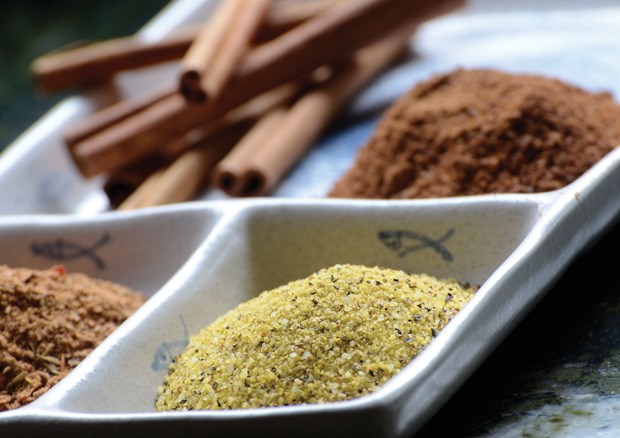The global spice trade is one of the most storied and intriguing facets of human history, beginning in antiquity and weaving its way through countless epochs, regimes, cultures, and philosophies.
The power of spice to season and scent is a phenomenon of ceaseless interest to our species.
Spice has, to varying degrees, always been surrounded by lore and legend, with certain seeds, roots, barks, and other organic flavouring compounds spawning enduring stories of their potency, mythic origins, healing properties and even taboo qualities.
Its trade has spanned the planet and, while modern import and export practices have co-mingled once disparate ingredients and have fostered a wonderfully global palate, each spice, to some degree, still preserves the aura of its origins, acknowledging ancient culinary traditions and rituals.
While it is common in the Western world to encounter a fusion of spices blended to create new flavour profiles, I continue to be fascinated by those long-standing culinary traditions that draw on specific families of spices to preserve and advance a regional
heritage or style.
So many of the flavours enjoyed across the world today come from the traditional spices of Western Asia, East Asia and the Indian subcontinent.
Here in North Vancouver, we are tremendously lucky to have a thriving restaurant scene that harnesses the culinary styles of these regions. Increasingly, however, I am discovering tremendous enjoyment in the exploration of regional approaches to spices at home, drawing on the staggeringly robust selection of goods available from local retailers.
At Lonsdale Quay, The Pepper Pot, recently re-located to the eastern wing of the market, boasts a great wall of spices packaged in sample-sized bags and priced to motivate fearless experimentation. Some high-end grocers around town offer pricey aluminum vials of spices, pandering to the fetishization of stylish packaging and largely ignoring the actual quality of the ingredients. Not so at The Pepper Pot.
I have been forced to triple wrap the fenugreek leaves I acquired there as the potency of their aroma otherwise dominates my entire kitchen; this is high-quality stuff. The small, open-access shop stocks an impressive array of spices, from common kitchen staples to rare and challenging-to-acquire specialty selections like date palm jaggery (rustic and flavoured golden, block-form sugar from India).
The shop's signature small sachets of spices start at $1 and rarely exceed $2.50. The Pepper Pot is also one of the only places where I can consistently find fresh and tender lemon grass stalks and spicy, woodsy galangal, both integral to authentic Thai cooking.
Just four-and-a-half blocks north of The Pepper Pot is a fantastic hidden gem of a shop called SJ Foods, purveyors of fine Indian culinary ingredients. The half block is explained by SJ's unique location in the alleyway between West Third and West Fourth streets, just west of Lonsdale Avenue.
This unassuming shop is stocked floor to ceiling with absolutely every ingredient necessary in the preparation of Indian food, spanning regional styles from Kashmir in the far north to Kerala in the south, and everything in between. SJ's service is personable and patient, ideal for the fledgling Indian cook.
It was here that I discovered the dangerous but inimitable asafoetida, that breathtaking root extract of the Ferula herb, an ingredient which, when used sparingly, can help transform a pedestrian lamb curry into a complex and unforgettable dish. Use too much of this stuff, however, and you'll end up trashing the whole pot of food, maybe even the pot itself, in an effort to rid your home of the noxious scent.
Continuing north along Lonsdale Avenue to 19th Street, we find Vanak Market and Deli, another local retailer of specialty spices. Vanak is owned by the same group that brought us Cazba Restaurant on West 16th Street, the kebab specialists that were favourably reviewed in these pages last August. Vanak, which occupies a significant floor space, supplies traditional Persian ingredients, also at an exceptionally reasonable price.
Here you will find sharbati (chia seeds), sour grape powder, rose water, preserved lemon, and herbal blends required to achieve the distinct and unique flavours of Persian cuisine.
Can't get your basmati rice to taste like it does at your favourite local Jujeh kebab restaurant? That's because you need a bag of sabzi polo herbs. The solution to that problem is a whole lot closer than you might have thought.
Chris Dagenais served as a manager for several restaurants downtown and on the North Shore. His regular restaurant review column, The Dish, appears in the Wednesday issues of the North Shore News and online at nsnews.com. Contact: [email protected].



